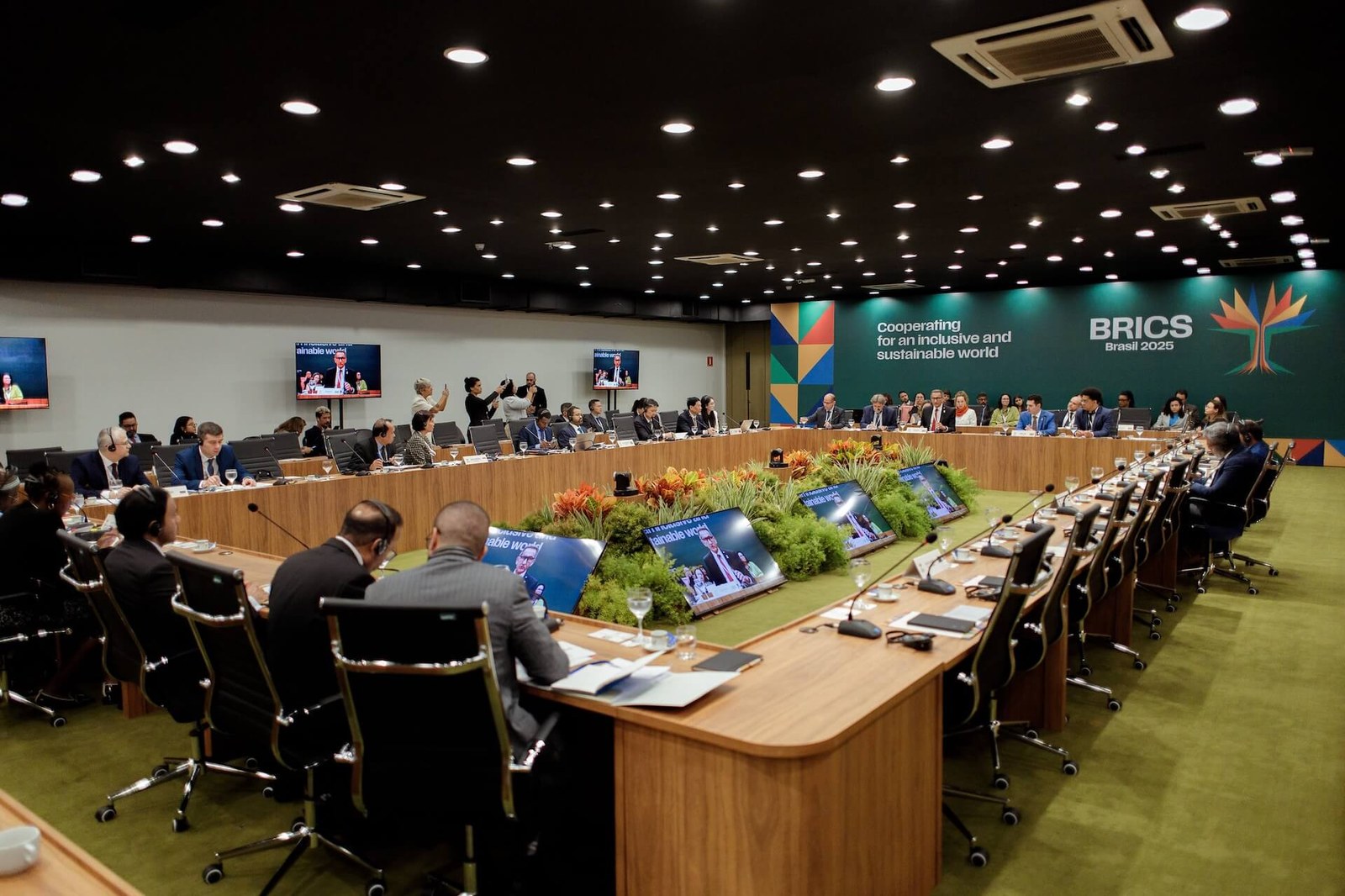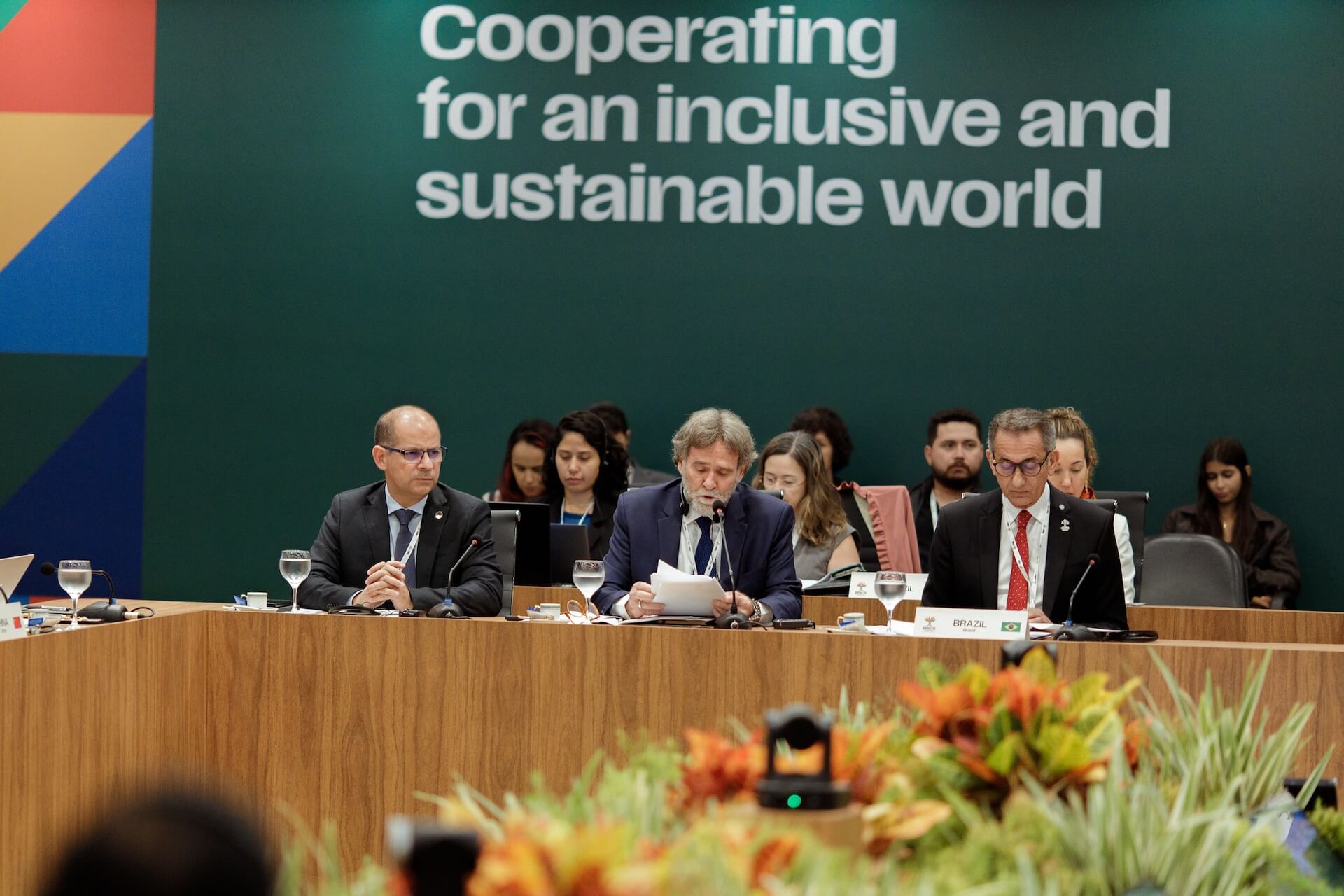BRICS Joint Declaration defines strategies to reduce risk of climate disasters
Document signed with unanimity presents the new Work Plan for 2025-2028, with concrete actions such as early warnings before extreme climate events.

By Maiva D´Auria | maiva.dauria@brics.br
The Itamaraty Palace, in Brasília, hosted this Friday, May 9, the BRICS Ministerial Meeting on Disaster Management. Representatives from the 11 countries that compose the bloc participated in the meeting to discuss strategies to reduce risks, strengthen climate resilience, and foster international technical cooperation — in a global context that is increasingly affected by extreme climate events.
The meeting was led by the Brazilian ministries of Integration and Regional Development (Integração e Desenvolvimento Regional/MIDR) and Cities (Cidades), which work jointly to formulate policies for urban adaptation and strengthening local capabilities in the face of climate change.
At the event opening, the Minister of Regional Development, Waldez Góes, highlighted the urgency of the environmental agenda and the need for cooperation among the countries.
“The increased frequency and intensity of disasters constitute an environmental emergency with direct implications for our countries’ development. This scenario amplifies structural inequalities, overloads public systems, and deepens social vulnerabilities, which require coordinated and integrated responses. In this sense, this meeting is not only a technical space but a call for collective and solidary action.”
Next, the Minister of Cities, Jader Filho, stressed the importance of international coordination to jointly address climate challenges.
“This meeting is not just about making decisions but also about listening to one another, joint learning, and strengthening ties among our countries. Brasil has been dedicated to building bridges that connect prevention and mitigation, always focused on reducing inequalities and protecting the most vulnerable populations. Our active participation at BRICS is a reflection of our commitment to leveraging public policies that strengthen resilient infrastructure and promote integrated actions to address disasters.”
Joint Declaration
During the Ministerial Meeting, the BRICS countries approved a Joint Declaration with guidelines for prevention policies and disaster responses. The document consolidated the group’s commitment to a shared agenda aiming at prevention, climate adaptation, and the promotion of sustainable development with social justice.
In the Joint Declaration, the members recognize that the increasing frequency and intensity of disasters, aggravated by climate change, have been causing negative social and economic impacts such as the increase in poverty levels and delays in development.
To address this scenario, the document highlights four fundamental principles:
1 - Integrating the dimensions of development and social justice in all disaster risk reduction areas;
2 - Strengthening the preventive approach according to the Sendai Framework for Disaster Risk Reduction 2015–2030;
3 - Orienting strategies to connect to the climate agenda; and
4 - Advancing the elaboration of sustainable resilience initiatives.
The Declaration reflects the unanimous understanding of the BRICS member countries that building an environment of sustainable resilience requires not only technical actions but also political commitment, solidarity among the nations, and valuing the diversity of contributions. In this spirit of cooperation, the Deputy Minister of Cooperative Governance and Traditional Affairs of South Africa, Prince Zolile Burns-Ncamashe, underscored:
“We must take a broader view when assessing the contributions of our partners — not only those of a privileged few, but of all who have shown commitment and integrity. No nation should elevate itself above others, for at the end of the day, we all share this world, and with it, the responsibility to build a more peaceful and just future.”
Work Plan
On the occasion, the 2025–2028 Work Plan was officially presented. Developed under Brazil’s leadership and adopted unanimously by the member states following months of constructive dialogue, the plan outlines strategic goals and priorities to advance international cooperation in disaster risk management, emphasizing climate change prevention, mitigation, and adaptation. The guidelines are intended to strengthen governance frameworks and translate commitments into concrete action.
The Work Plan includes four cross-cutting priorities: addressing inequalities to reduce vulnerabilities; establishing robust early alert systems and strengthening the capacity for anticipatory response; developing resilient infrastructure; and integrating local and national traditional knowledge into the disaster risk reduction systems.

According to Brasil’s National Secretary for Civil Protection and Defense, Wolnei Wolff, from MIDR, the challenges faced by the member countries present similarities, which reinforces the importance of joint action.
“After this meeting cycle, we managed to approve this work plan and establish clear goals for the next four years. During the exchange of experiences among the countries, we realized that the climate crisis affects the country as a whole. And the problems are more or less common among the countries that compose BRICS. These challenges are heightened by climate change, which is subjecting us to increasingly frequent and intense extreme events.”
The actions listed in the Plan include:
● Producing Community-Based Disaster Risk Reduction Plans;
● Implementing Early Warning Systems;
● Developing Resilient Infrastructure;
● Integrating Nature-Based Solutions;
● Designing Sustainable Financing Models.
Name change
The member countries also agreed to update the name of the group to reflect its missions and scope in the context of multilateral cooperation within the BRICS with more precision. As of this meeting, the new name will be “BRICS Disaster Risk Reduction Group”.